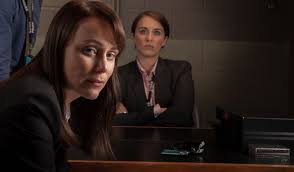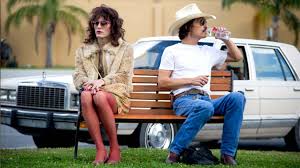Archive for category Theatre
Ring out the old, ring in the new
Posted by cathannabel in Events, Music, Personal, Theatre on December 31, 2022
Every week, for the last three and a half years, I’ve posted on Facebook about ‘Good Things’. This isn’t a ‘let’s not talk about the bad stuff’ exercise – it acknowledges, explicitly, that the reason I’m doing it is because there is a lot of bad stuff, globally and personally, and it is thus important sometimes to home in on and hold on to the good that is there, even if that good stuff seems rather small and trivial in comparison to war and climate change and poverty and everything. It’s not ‘always look on the bright side’ so much as ‘always look for the bright moments’. Older readers might think of the 1913 children’s book Pollyanna, whose central character is known for being relentlessly cheery at all times. Whilst this can be rather cloying, and I would refute the notion that there is something good to be found in every situation, the idea that it is healthy to remind oneself that there are good things is a valid one. Which is why I’ve kept those posts going, and why they invariably get likes and comments, and people urging me to continue.
It’s certainly not as if the period during which I’ve been doing this (and there were sporadic efforts before, my ‘reasons to be cheerful’) lent itself particularly to optimism, on any front. The world has been going to hell in a handcart faster than ever, it would seem. And on a personal level, when I posted my first ‘Good Things’ my youngest brother was terminally ill with cancer. He died the following February, just before the pandemic deprived us of so many of the things that might normally bring us comfort in hard times. Then, of course, in October 2021, I lost my husband. He died less than 24 hours after I’d posted that week’s Good Things, and when I re-read it I realised that despite the horror of what had happened, I stood by everything I’d said. Those good things were real and true and not invalidated by the huge Bad Thing that had engulfed us. So I’ve carried on.
It’s hard to find much on the national or global scale to celebrate – at most, some things didn’t turn out quite as badly as we feared (the US mid-terms, notably). Our government was incompetent and corrupt, chaotic and callous, as we’ve come to expect, and the usual people are suffering as a result – don’t be poor, don’t be disabled, don’t be old, don’t be sick, and for heaven’s sake, don’t be a refugee… Conspiracy theories, whether about climate change or vaccines or anything else one can think of, seem to be multiplying and spreading more rapidly each year, not helped by the takeover of Twitter, already an excellent breeding ground, by a leading conspiracy theory enabler and exponent. Ukraine is still suffering under – and fighting back against – the Russian invasion. Women in Afghanistan are shut out of the universities. It is easy to despair.
Of course there are always good people standing up for the vulnerable. The RNLI will carry on risking their members’ lives to save those whose dinghies are capsizing in the Channel. Food banks will continue handing out essentials to families who can’t make ends meet. Individuals and organisations will continue to provide safety nets, to challenge bigotry, to tell the truth and to shame (or at least try to shame) the powerful into using their power for good, and the brave will stand up anyway, in Iran and Afghanistan as in so many other places, whatever the risk.
In my own life, despite the sadness, I’ve had good things.
I got a new knee in February and (after a short but tough period of recovery) that gave me the confidence to be braver and more adventurous than I would have done otherwise. I went to Wembley to the Championship Playoff final, with my son. (The football has actually been a Good Thing in 2022, the first year for decades when I could have said that.) I went to Progfest with my brother in law and to the Tramlines music festival, with my son and with friends. I travelled to Rome, on my own (but was met by my brother, with whom I stayed). I would have done none of those things without the op, I would have been too scared, not only of the pain, but of my knee suddenly refusing to bear my weight, or of falling. That fear nearly paralysed me when he died – I could see myself so easily becoming virtually housebound, dependent entirely on others to get around, and that hasn’t happened.






I have needed more help this year, especially without a car or someone to drive it, and I’ve always found the help that I’ve needed, sometimes by asking very directly for it (anyone taller than me – i.e. most adults – entering the house is likely to be greeted on the doorstep with a request to change a light bulb or lift something down off a high shelf), at other times because some nice young man or woman has seen me struggling with a suitcase or whatever and has offered assistance. I’ve also found someone to help me with the cleaning, someone to help me with the garden, a handyman and a decorator.
I finished the PhD, submitting just over a week before he died, and had my viva in May. I’m very proud of the thesis, and I absolutely could not have done it without his support, in big ways and small – so many times I was writing away, lost in my work, only to realise that he had snuck in, delivered a hot cup of tea or coffee and snuck out again, without breaking my train of thought.
I’ve been to the theatre, to a stunning production of Much Ado, by Ramps on the Moon which used its cast of (mainly) deaf and disabled actors inventively and boldly, and tweaked the text accordingly. Much Ado works or doesn’t depending on Beatrice and Benedick, and here both were outstanding and unforgettable. The Guardian reviewer described Daneka Etchell (who is autistic) as ‘the most compelling Beatrice you might ever see’, and she was responsible for an extraordinary scene, when, in her distress at the injustice being inflicted on Hero, she starts stimming. Both her anguish and Benedick’s tenderness in trying to help calm her were very moving.
We very much enjoyed a performance by Under the Stars, an organisation who we supported with Martyn’s memorial fundraiser, who are an arts and events charity for people with learning disabilities and/or autism, running music and drama workshops and nightclubs. The play was The Many Journeys of Maria Rossini and it used words, music and dance, exuberantly and engagingly, to tell the story. Under the Stars band also performed at Tramlines.
Final theatre outing of the year was to Richard Hawley’s musical Standing at the Sky’s Edge, which we’d somehow missed when it was first produced at the Crucible in 2019. We loved it. The musical weaves together the stories of some of the inhabitants of Sheffield’s Park Hill flats, over five decades, telling those stories through some of Hawley’s songs. The action is beautifully choreographed, the singing is marvellous, and it builds to a very moving climax. Obviously this piece has special relevance and resonance for Sheffielders, but it goes beyond that – every major city has communities like Park Hill.
I’ve done my usual summaries of what I’ve read and watched over the year. As far as listening to music at home goes, I’ve tried to develop my own approach to music nights, which were so much about our shared enjoyment of music that initially I couldn’t see at all how I would do it. Now, I pick a few things over the course of the week, prompted by someone mentioning an artist or a band, by an artist’s death, or some other kind of event, just so that I don’t get paralysed by the vast choice when I look at our CD wall. I listen when I can to the Radio 3 weekend programmes we used to love, to Inside Music, Sound of Cinema, Music Planet, J to Z, Jazz Record Requests, and these also often suggest what I listen to from our collection.
Highlights amongst the music that I’ve heard live this year:
- Beethoven String Quartets plus a piece by Caroline Shaw (‘Entr’acte’), in a Music in the Round concert which I sponsored in Martyn’s memory, at the Crucible in May
- Focus, the highlight of the Progfest in April. Still led by Thijs van Leer, who may not be able to reach all the high notes these days but is still a great performer, and the band (which included Pierre van der Linden, another veteran) was great and of course the music brought back so many memories of listening with Martyn.
- Jazz Sheffield gigs from Laura Jurd, Zoe Rahman and the Espen Ericksen Trio with Andy Shephard, all excellent.
- Tramlines highlights: my old favourite, the Coral, and new favourite, Self Esteem.
- A rare orchestral concert, at a great venue, the Auditorium in Rome: Gershwin, Bernstein and Stravinsky.


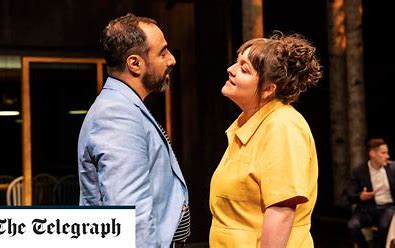
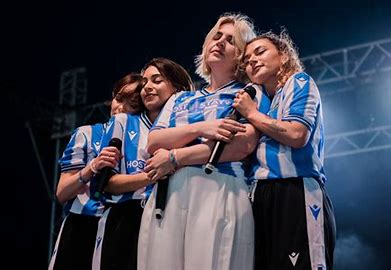
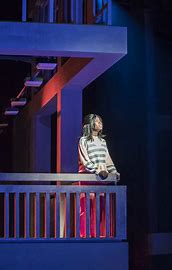

Last New Year’s Day was one of the hardest to wake up to in all of the days since he died. Knowing that I was about to start on a year without him, the first year without him since 1973… It was bleak. Perhaps, whilst this NYE/NYD will acknowledge the sadness, it may be easier. I hope it will be less bleak, less raw.
So, allons-y to 2023. I will formally graduate (for the last time, definitely, categorically) on 11 January, and my next project will be to look for a publisher for a version of the thesis. I’ll have chapters published in two forthcoming books, both on W G Sebald. I’ll travel, to see friends in Scotland, to see family in various parts of the country, maybe a city break in Europe. I’ll go to two family weddings. I’ll finish phase 2 of the decorating, maybe even phase 3. I’ll carry on sharing the cultural riches of Sheffield with friends and family.
Without being Pollyanna-ish, I do know how very lucky I am, to be surrounded by people who want to and do help me, emotionally and practically. I am thankful for them, every day.
For you, I wish for health and strength, for peace and comfort, for love and support.
In 2023 I wish, of course, for a world without war, a world where people are not persecuted for their beliefs, or simply for who they are, a world where women can be safe on the streets and in their homes. I wish for action on climate change, before it’s too late. That’s a lot, I know.
But as we go into another new year I think, as always, of this poem, which gives me hope.
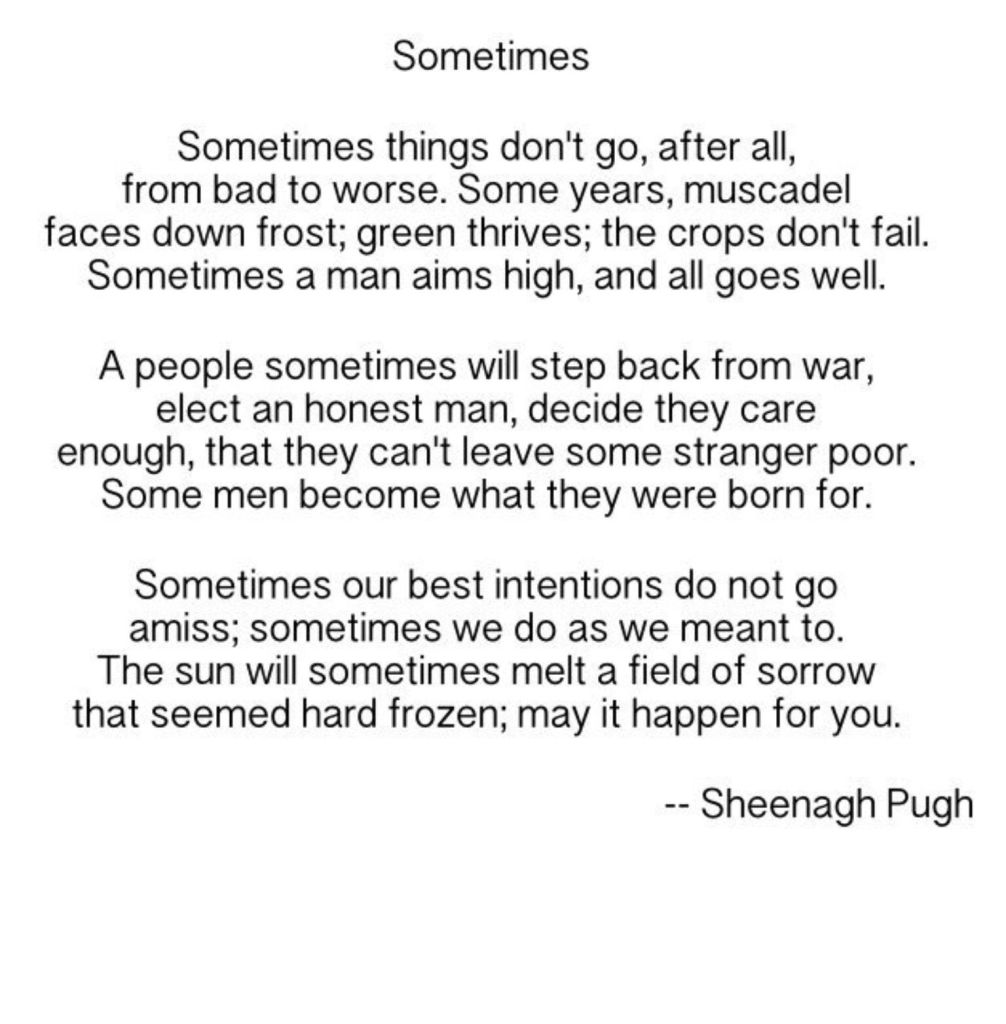
2017 in Film and TV – the best bits
Posted by cathannabel in Film, Music, Television, Theatre on December 22, 2017
It was a good year for superheroes. Most specially because of Wonder Woman, not because it was the best of its genre this year necessarily but because for the first time with a superhero movie I didn’t have scroll through hundreds of images to find one where a woman was centre screen, in charge. I wrote about the film, how it made me feel, the exhilaration of seeing all the tropes I love about superhero movies but with a woman, a glorious, magnificent woman, where usually there is a man, or mainly men (quite possibly glorious and magnificent in their own right, but still).
I loved Guardians of the Galaxy 2, warming to it despite a phase when I wearied of some of the schoolboy humour, until I realised what that was telling us about these lost children, and how they were forming a strange, new family. There was plenty of daft humour too in Thor: Ragnarok, as one would expect given that Taika Waititi was directing (responsible for last year’s delightful Hunt for the Wilderpeople and for What we do in the Shadows). And it was perhaps a sign of changing times (and not a moment too soon) that Valkyrie is played as a cynical, world-weary, boozy mess who comes through when she is needed, such a male archetype. As well as obviously kicking ass in a most splendid way. Spiderman: Homecoming was charming, funny and really used the notion that Spidey is an adolescent boy, cleverly and with heart. Logan, though, of all the films that belong broadly in that genre, was the one to break your heart. With gripping valedictory performances from Jackman and Stewart, and a mesmerising and terrifying one from Dafne Keen.
Star Wars is not so much my thing. I did enjoy the first trilogy, albeit critically, but I never felt them to be mine, and I have never even seen the prequels (nor do I intend to). But I loved The Force Awakens, and I loved Rogue One, and I look forward to seeing The Last Jedi before long.

War for the Planet of the Apes was brilliant – referencing Biblical epics, Westerns, Apocalypse Now, Schindler’s List and probably other genres and specific films as well, whilst maintaining the power and emotional heft of its predecessors.

My efforts to find an image for each film in which a woman is prominent were doomed in the case of Dunkirk. That’s fair enough, given the premise, I didn’t expect women to feature other than in traditional roles – as nurses, or serving tea and jam sandwiches. There has been a more serious issue raised, that of the absence of non-white faces. I don’t honestly believe this was a deliberate whitewashing, nor do I accept that just because Farage liked the film it was a pro-Brexit parable. But it would have taken very little to ensure that there were visible representatives of the Royal Indian Army Services Corp companies, or the lascar crewmen on British merchant vessels that took part in the evacuation. They were there, and this could have been conveyed without changing the basic structure of the film and its deliberately narrow focus on a few of the rescued and rescuers. But having said that, whilst watching the film such considerations never crossed my mind. I was overwhelmed, by that intense focus, by the score which built and built the tension until it was almost unbearable (and the use of the Elgar Nimrod as the first of the little ships appeared reduced me, predictably enough, to sobs), and by the non-linear structure which forced one to concentrate, to hold those strands together even as the direction teased them apart.

The opposite for the next two movies – three women foregrounded in each of them. I wrote about Twentieth-century Women for International Women’s Day,

and Hidden Figures we missed at the cinema but caught on DVD – uplifting and inspiring even if, oddly enough, the sexism and racism they encountered was actually ramped up for the benefit of the story. Who would have thought that could ever be necessary?
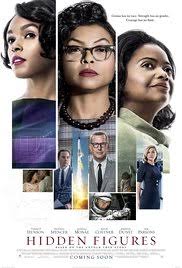
Baby Driver was beautifully described by Empire as:
not a film just set to music. But a film meticulously, ambitiously laid over the bones of carefully chosen tracks. It’s as close to a car-chase opera as you’ll ever see on screen.
Even if the narrative arc (young man in debt to gangster does ‘one last job’ and finds out there’s no such thing) is traditional enough, the choreography, the seamless blend between diegetic and exegetic music, make it entirely original and massively enjoyable.
La La Land inspired me to write about musicals. It was gorgeous and delightful and poignant and much more that I wanted to say was expressed so well in a piece on the marvellous That’s How the Light Gets In blog.

And one more cinema outing, a rather lengthy but entirely captivating one, for Bertrand Tavernier’s Journey through French Cinema. It is what it says, a journey and a personal one at that, through French film from Tavernier’s first childhood moment of enchantment, on through the decades as he goes from a kid in the audience to a film maker himself. I believe there’s a follow-up in the making, bringing his journey more up to date, to which I will happily commit as many hours as it takes, as soon as it’s out.

Mind you, speaking of French cinema, I should really note that we did go to see Elle. However, my feelings about that film are so predominantly negative, that despite my overwhelming admiration for Huppert, and despite moments of brilliantly black comedy, I shall pass over it without substantial comment.
On to the smaller screen.
As always a good deal of crime fiction. The dramas noted below are not an inclusive list of what we watched. There were others that were workaday, or that strained credulity with plot craters and characters who behaved with a stupidity that was at the same time predictable and utterly inconsistent with what we already knew of them. I’m not going to name the guilty parties, just those that we were gripped by and that managed to avoid the worst clichés and pitfalls of the genre.
Sherlock: The Final Problem certainly didn’t give us genre cliché. What it all meant, and indeed, whether it meant anything at all or was just a clever game, is uncertain. The Guardian‘s reviewer was a bit cross about it, but identified two main strands in the narrative:
One was a subtle, beautifully crafted backstory about Sherlock’s childhood. The other was a fun if unfulfilling gameshow of wild hypotheticals, where everything was at stake yet it often felt as though very little was.
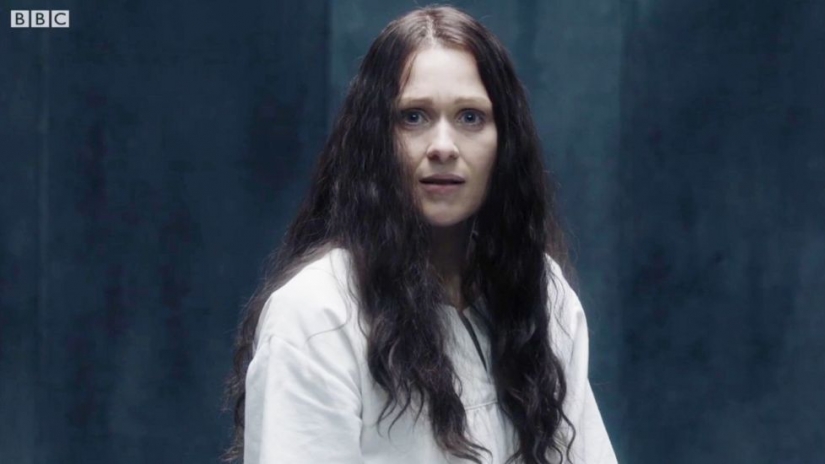
It was frustrating and baffling but it didn’t make me cross, I was perfectly willing to believe both that it did mean something and that it was just a fascinating puzzle that I would probably have no chance of unravelling.
Line of Duty series 4 was just superb. Thandie Newton’s Roz Huntley was absolutely compelling, and the plot twisted and turned as we were made to question everyone’s motives and integrity, at least briefly. It had the classic LoD set pieces in the interview room, plus shoot outs and chases, and a plot that at least started to weave together strands from series 1-3, whilst leaving plenty to look forward to in series 5, which cannot come around too soon for me.
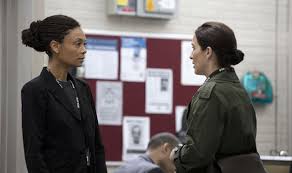
The Missing had only one character in common with series 1, the grizzled detective (Tchéky Karyo) who I was very glad to spend another few hours with. Keeley Hawes and David Morrissey were both excellent, as always. The narrative begins, in a sense, at the point that one might expect it to end, with the return of their missing daughter. Of course, it’s not that simple, it’s complex and agonising, and unexpected.

Broadchurch 3 was much better than 2 (which I quite enjoyed at the time but actually struggle to recall what it was all about, really, apart from Joe’s not guilty plea). The handling of the rape case was generally excellent even if the resolution left a few dangling plot threads that didn’t quite make sense. Julie Hesmondhalgh was wonderful, as were, obviously, Tennant, Colman and Whittaker.

Strike was an excellent adaptation of the first two of Robert Galbraith (aka J K Rowling)’s Cormoran Strike novels. Tom Burke and Holliday Grainger were perfect in the lead roles, and I look forward immensely to the adaptation of the third and any future novels in the series.

I Know Who you Are was a fairly bonkers Spanish series in which most characters were pretty despicable, and one of the two genuinely sympathetic people didn’t make it out alive. The only morality that prevailed was Family and within that there was a hierarchy of loyalty – to attempt to murder one’s sister in order to protect one’s son was seen by most characters (including the intended victim) as pretty reasonable. It was all thoroughly enjoyable.

Unforgotten 2 was profoundly different, as Nicola Walker and Sanjeev Bhaskar unpicked another cold case. They are both deeply sympathetic characters and the whole thing is imbued with a kind of compassion and empathy that draws in the damaged people whose lives have been twisted in various ways by the past crime.

Rellik very cleverly subverted the way in which the detective story must follow a retrograde narrative path, starting with the crime and working backwards, by starting with the crime’s (apparent) resolution and working backwards and backwards, until in its final episode it leapt back to the beginning/end and a shocking dénoument. The structure took a bit of getting used to and never quite stopped being unsettling, but we thoroughly enjoyed the ride. It was produced by Harry and Jack Williams (The Missing) and featured, amongst other excellent performances, the wonderful Rosalind Eleazar as an early suspect.

Witnesses was the second series of the French crime drama starring Marie Dompnier. This one also stars Audrey Fleurot, who we know from Spiral, and whose return in that series we look forward to impatiently. Witnesses was compelling and baffling and ended most enigmatically (none the worse for that – I’d rather have honest to goodness open endings than ostensibly tidy endings that actually leave loose threads all over the place).

Fargo 3 brought us not one but two wonderful female cops. Gloria Burgle (Carrie Coon) and Winnie Lopez (Olivia Sandoval). And not one but two Ewan McGregors, as he plays twin brothers. One David Thewlis was more than enough, however – his villain was quite the most revolting, viscerally unpleasant character I’ve seen on screen for some time. That’s a compliment (I think) to the writing and the acting. Lord knows where this one is going next but we’ll be more than happy to go along. Fargo also introduced the wonderful phrase, ‘unfathomable pinhead-ery’ into our vocab, for which we are truly thankful.

Telly sci-fi had an altogether brilliant year.
Agents of Shield had an outstanding season with a multi-layered narrative that messed with our heads and our hearts. Beautifully played and written, and quite breathtaking.

Orphan Black reached its fifth and final season, having maintained its form throughout the four years that it has been running. The weight of the series is carried – seemingly effortlessly – by the awesome Tatiana Maslany, who plays not only various clone ‘sestras’ but at various times plays one of them masquerading as one of the others. It’s dazzlingly done. It also stars the rather wonderful Maria Doyle Kennedy as Mrs S.

We’re not far through Star Trek: Discovery yet, but from episode 3 on were hooked. Yes, OK, that coincides with the arrival of Jason Isaacs, but it’s not just because Jason Isaacs. Sonequa Martin-Green is excellent, as is Anthony Rapp, and Mary Wiseman as cadet Tilly. It’s visually brilliant, and the plot is loaded with moral ambiguity from which it does not flinch. It promises much and we look forward to it developing further.

I remain loyal to The Walking Dead even though no one could claim that it’s unproblematic. The tone and pace are extremely uneven and it depends far too often on (a) plot armour, (b) magically inexhaustible ammo and (c) people who we know are capable of good judgement behaving with unfathomable pinheadery. Nonetheless, I cannot envisage giving up on it. I have to see how this plays out – and there are episodes which grip and compel and convince.
Possibly the only one of my top TV shows which features in the critics’ lists is The Handmaid’s Tale. I also read the book for the first time, as part of my 60 books in 60 days challenge. So much has been said about the series that I don’t feel I can add anything especially insightful – it was horrifying and terrifying and brilliantly done.

And of course there’s Doctor Who. I wrote about the (to me, brilliant) news that the next Doctor will be a woman. Nonetheless, much as I look forward to seeing what Jodie Whittaker brings to the role I will need to grieve first for Peter Capaldi’s doctor, who I have loved – and for Pearl Mackie who has been a wonderful companion. PC’s final series was excellent, and the finale was heart-stopping and moving.
“I’m not trying to win. I’m not doing this because I want to beat someone, because I hate someone, or because I want to blame someone. It’s not because it’s fun. God knows it’s not because it’s easy. It’s not even because it works because it hardly ever does. I do what I do because it’s right! Because it’s decent! And above all, it’s kind! It’s just that… Just kind. If I run away today, good people will die. If I stand and fight, some of them might live. Maybe not many, maybe not for long. Hey, you know, maybe there’s no point to any of this at all. But it’s the best I can do. So I’m going to do it. And I’m going to stand here doing it until it kills me. And you’re going to die too! Some day… And how will that be? Have you thought about it? What would you die for? Who I am is where I stand. Where I stand is where I fall.” — The Doctor


Three docs worth mentioning. Suzie Klein’s Tunes for Tyrants explored 20th century music in the context of Nazi and Stalinist oppression. She’s an excellent presenter and the material – and the music – was fascinating and powerful.

Bowie’s departure from this dimension was – for me amongst others – the greatest loss of 2016, a year of losses. Bowie – the Last Five Years brought us the final phase of that extraordinary story, as he worked on his last two albums, and the stage musical Lazarus. We were reminded, as if we could forget, not only of his talent, but of his humour and intelligence, his warmth and wit. And that last body of work is not only a worthy finale to his career but imbued with a sense of mortality and the fragility of life.

Neil Brand is one of my favourite music-explainers. Charles Hazlewood and Tom Service have got that nailed in terms of classical music but for the music of stage and screen, for the popular song, Neil is your man, and The Sound of Musicals was a delight.

We loved Poldark, and not just for the scenery.
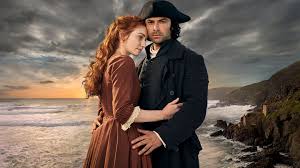
The Replacement was a bit bonkers but both Vicky McClure (see also Line of Duty) and Morven Christie (also in The A Word, series 2 of which isn’t covered here only because it’s yet to be watched) were excellent.

And another favourite of mine, Suranne Jones, was magnificent in series 2 of Doctor Foster.

We got to see Jodie Whittaker pretending to be a doctor in Trust Me. Plot holes a-plenty (unless they’re just an indication of a second series coming up?) but well done, and well played by JW – looking forward to her being a real Doctor shortly.

Homeland was on excellent form, with the dynamics between Carrie and the new female PotUS adding a new dimension to the plot.

And Spin took us back into the shadowy world of French political manouevering.

It wasn’t all screen based culture. I made several visits to Leeds Grand Theatre for Opera North productions, some of which I reviewed for The Culture Vulture (see the Reviews page of this site, which also features my review of the Sheffield Crucible’s production of Julius Caesar). I also saw at Leeds Grand a magical production of Rimsky-Korsakov’s The Snow Maiden, at the Crucible, an intense Desire Under the Elms, and in the Crucible Studio various splendid Music in the Round chamber music concerts.
So, thanks to all who’ve shared these delights with me. Liz, Viv, Arthur, Ruth, Aid, Dad, and of course him that I’ve been watching telly and going to the pictures and going to gigs and plays with for >40 years…
2016 in TV, theatre and music
Posted by cathannabel in Music, Television, Theatre on December 13, 2016
I’m very conscious that I’ve watched very few of the series which are getting the Best Of accolades from the quality press. Some of them are sitting on our BT Vision box waiting to be watched, others we didn’t catch on to until they were underway and so are now waiting for the repeats.
Some of what we did watch was old stuff, the crime series that circulate on the Drama channel or ITV3, of which the best was undoubtedly Foyle’s War, for its meticulous attention to historical detail and the wonderful, understated central performance by Michael Kitchen.
We came late to the Scandi party, having missed The Killing altogether, and caught up with the Bridge only on the most recent series, but did enjoy Follow the Money (financial shenanigans), Blue Eyes (politics and right-wing terrorism), Trapped (murder, human trafficking and a heck of a lot of snow). And whilst we wait for Spiral to return, we saw its late lamented Pierre being an unmitigated shit in Spin.
We enjoyed the latest series of Scott & Bailey, Shetland and Endeavour. But the prize here goes (again) to Line of Duty. Vicky McClure and Keeley Hawes were both formidable and the tension brilliantly ramped up.
The Returned returned. Series 2 was as full of mystery and atmosphere as Series 1 and thankfully did not feel the need to offer tidy solutions. It left loose ends, but in a way that suggested the cyclical nature of events rather than anything that could be resolved by a third series.
Orphan Black’s penultimate series was as always thrilling and funny and complicated, with Tatiana Maslany triumphantly playing multiple roles, with such confidence and subtlety that I still occasionally forget that it’s all just her.
The Walking Dead ended its last season on a horrific cliffhanger, and the opener was pretty grim as well. I have doubts about the series – it is inevitably repetitive: our group finds what looks like a haven, the haven is compromised/invaded, a few of our lot are offed, a few new bods tag along, and on they go to the next apparent haven. The big shift is that as the series have progressed, the greatest danger is no longer from the walkers, since their behaviour is predictable and the survivors have developed effective tactics for defence and despatch, but from other more ruthless survivors. This is interesting territory (the walkers themselves are pretty dull, after all), but I’m not convinced by the way the writers are handling the current storyline. And they’ve shown a worrying tendency to make people act out of character, to do utterly stupid things that they know are utterly stupid, in order to move the story along. So, the jury is out, but I will be watching, whatever.
We also thrilled to The Night Manager, London Spy and Deutschland 83, and to the latest adaptations of War and Peace, and Conrad’s The Secret Agent.
The A Word was wonderful – I know that parents of autistic children had some quibbles, particularly about the way in which children who are ‘on the spectrum’ so often are shown as having special abilities, like Joe with his encyclopaedic knowledge of 80s pop, which is not always the case. But this was the story of one child, and his extended family. The performances were superb, the writing subtle and nuanced, and the image of Joe marching down the road, earphones on, singing ‘World Shut Your Mouth’ or ‘Mardy Bum’, will stay with me for a long time.
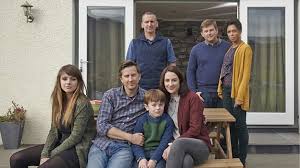
Raised by Wolves had a splendid new series, and then was inexplicably and inexcusably cancelled. Still hoping that Caitlin Moran’s crowdfunding project gets sufficient support to bring it back.
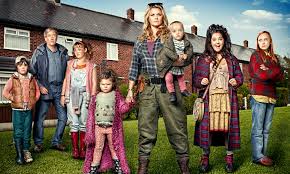
Normally my TV of the year would include Doctor Who, but we’ve had a hiatus this year, and will have to wait till Christmas Day for the special, and then 2017 for a new series (and a new companion). Meanwhile there was Class, on BBC3, which got off to a promising start, but as I’ve only seen 3 episodes so far, all comment and judgement is reserved until we’ve caught up.
At the theatre this year we saw two Stage on Screen performances at the Showroom – the Donmar Warehouse production of Liaisons Dangereuses, with Dominic West and Janet McTeer, and Anthony Sher’s magnificent and heartbreaking Lear.
Patrick Stewart and Ian McKellen at the Lyceum Theatre in Pinter’s No Man’s Land were deeply unsettling as well as darkly funny.
And we saw a glorious reimagining of The Duchess of Malfi, transported to West Africa, as Iyalode of Eti.
Opera North at Leeds Grand Theatre – Andrea Chenier, Giordano’s French Revolution tale of loyalty and revenge and love. And a glorious Puccini double bill – Il Tabarro, and Suor Angelica.
Of course there was Tramlines, about which I have rambled euphorically already. There was also Songhoy Blues in a Talking Gig, performing (and talking) after a showing of the remarkable documentary They will have to Kill us First, about the repression of music in Mali by Islamist extremists. Malian music is something else I have rambled euphorically about, and Songhoy Blues in particular.
Two gigs in the Crucible Studio, the first under the auspices of Sheffield Jazz – The Kofi Barnes Aggregation, a collaboration between two splendid, but very different, saxophonists. And the Unthanks were as spinetingly and goosebumpy and lump in the throaty as I could have imagined, whilst being, in person, down to earth and funny and delightful.
Of course the year began with, in the space of just a couple of days, hearing the new CD from a musician whose music has been part of my life since I was a teenager, and then learning of his death. David Bowie is far from being the only important musical figure to pass away this year – indeed, that great gig in the sky is looking pretty crowded now, with Prince, Leonard Cohen, Keith Emerson and Greg Lake, Sharon Jones, Mose Allison, Pete Burns, Prince Buster, Gilli Smyth, Alan Vega, Dave Swarbrick and George Martin, to name but a few, rocking up over the course of the year. But Bowie was the one who meant the most to me.
2015 – the best bits
Posted by cathannabel in Events, Film, Music, Personal, Television, Theatre on December 30, 2015
This was the year we threw off the shackles of paid employment. Martyn first, in March, and me at the very close of 2015. It feels terrifying and liberating all at once.
For me, this new freedom will give me more time to do the things I care most about. My PhD, which I hope I will now be able to do justice to. And Inspiration for Life, in particular the 24 Hour Inspire. Of all the things I’ve done over the years, this is what I’m proudest of.
And I hope of course to have more time to do the other things I love, more time to read, write, listen to music, go to gigs, go to the cinema/theatre, meet up with friends, travel, watch some of the box sets which are gathering dust by our DVD player…
Below are some of the cultural highlights of 2015. I’ve been lucky to have access to Ensemble 360, Opera North, Tramlines, Sheffield Jazz etc, and to have wonderful friends and family to share these experiences with.
Film
The best of the year, without a doubt, was Timbuktu. Abderrahmane Sissako’s film is both beautiful and harrowing, a passionate cry from the heart about the threat posed by fundamentalist jihadists to the people, the culture and the music of Mali.
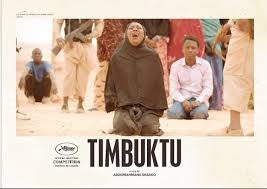
I won’t rank my other favourites, but they are:
Inside Out – Pixar at its very, very best. Clever, imaginative, daring, funny and moving. As the Guardian review said, ‘In the film’s wildest moment, the wanderers enter a zone of abstract thought, where they are zapped into a series of increasingly simplified geometric shapes, as they – and the film itself – dizzyingly self-deconstruct (“Oh no, we’re non-figurative!”)’.
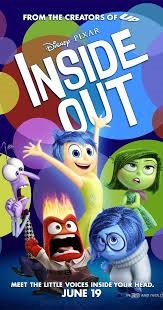

A Girl Walks Home Alone at Night – Ana Lily Amirpour’s film has been tagged as ‘the first Iranian vampire Western’. Atmospheric and full of unexpected touches (including a skateboarding vampire), and a powerful feminist narrative. Sheila Vand has a fascinating face that can look very young and somehow ageless at different moments.
Love and Mercy – biopic of Brian Wilson, portrayed both in the Beach Boy years and in later life, by Paul Dano and John Cusack respectively. Cusack’s portrayal is fascinating – seeing the clip of the real Brian Wilson at the end of the movie, I realised just how perfectly he had captured him, despite the lack of obvious physical resemblance.
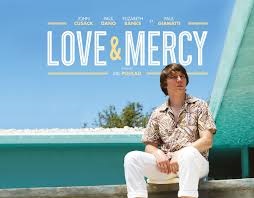
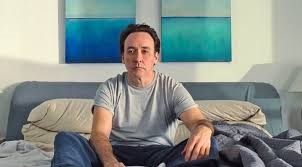
I Believe in Miracles – the story of Nottingham Forest’s astonishing European Cup success. A joy from beginning to end. And featuring a couple of brief glimpses of my kid brother who was a ball boy at one of those games, as well as glorious clips of my all-time footballing hero John Robertson at his best. And funny and poignant anecdotes from the players, and clips of Clough running rings around interviewers.
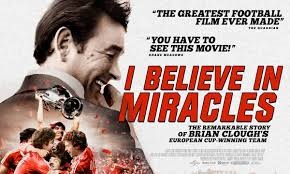
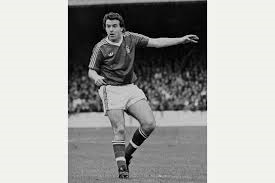
Mad Max: Fury Road – just a blast, possibly the best action movie I’ve seen, with a powerful female lead in Charlize Theron’s Furiosa (an action movie that passes the Bechdel test!), visually almost overwhelming and with an awesome soundtrack. And the Doof Warrior.
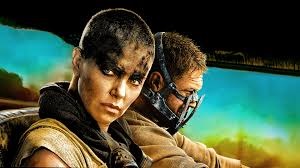
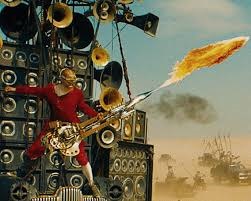
Avengers: Age of Ultron. I’ve written previously about how much I love the Marvel films. This was a joy, thanks in large part to Joss Whedon’s crackling dialogue (the script is often where costs are cut in big budget movies, but thankfully not here).
TV
Lots of Marvel here too, with Agent Carter, Daredevil and Agents of Shield all delivering in spades. Daredevil was the darkest of the three, but the others had their moments and all had humour, well-drawn characters and moments of poignancy as well as action. In other sci-fi/fantasy telly, Tatiana Maslany continued to be astonishing in Orphan Black, The Walking Dead continued to ramp up the tension till it was almost unbearable, and left us at mid-season break with everyone we care about in mortal peril – again. The latter also spawned a prequel (Fear the Walking Dead) which showed the start of the crisis – the bit we missed as Rick Grimes was in a coma in hospital whilst society crumbled in the face of the undead onslaught. And Humans was a thought-provoking and engaging take on issues around AI and what makes us human.
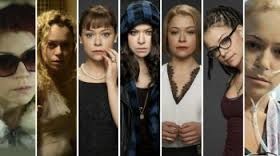
As always we watched a lot of detectives. Two French series – old favourite Spiral was back (we missed you, Laure, Gilou, Tintin et al), and a new drama, Witnesses, was complex and compelling with an intriguing female lead (Marie Dompnier). River was something else – Stellan Skarsgaard’s broody Nordic cop haunted by ‘manifests’ of his dead partner amongst others. Nicola Walker was stunning in this, as was Adeel Akhtar as River’s actual living partner. Walker also caused considerable potential confusion by simultaneously leading in Unforgotten, which made one forget the implausibility of an entire police team investigating a very cold case (and nothing else, apparently) by the subtle and compassionate portrayal of the various suspects as their past actions resurfaced to disturb the lives and relationships they had built. No Offence was refreshing too (though we felt uneasy with some particular plot developments in the later part of the series) with Joanna Scanlan’s DI being startlingly rude, but also funny, forceful and warm, and a fab supporting cast.
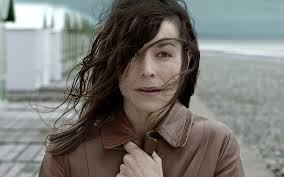
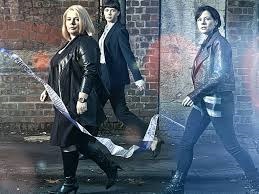
This is England 1990
This is England deserves a much more in-depth consideration than I can give it here – one would need to re-view the whole series from the film to this final (if it is indeed that) instalment. But there’s no denying – they can be a tough watch, as brilliantly funny as they often are. It’s not just the moments of horrifying violence, I think the hardest thing would be to have to go through again with Lol her descent into despair in TiE 88. Vicky McClure’s performance was intense without any histrionics and all the more devastating for that. This final part had moments too, relating to Kelly, and to Combo, which stay in the mind. And whilst the ending was upbeat, with that long-postponed wedding and Kelly’s return to the fold, Milky’s separation from the group and the reasons for it, and the likelihood that Kelly’s recovery will not be as straightforward as all that, mean that the darkness is not far away. It’s been a hell of a series, with superb writing and direction and equally superb performances.


Raised by Wolves
When it comes to comedy I can be a hard woman to please. Not that I don’t like a laugh, GSOH, that’s me. But I’ve given up on so many sitcoms because they’ve made me cringe more than they’ve made me chuckle. However, despite feeling slightly neutral about the pilot, I did get into Raised by Wolves, and fell rather in love with the magnificent Della (Rebekah Staton) as well as with the writing, which as expected from Caitlin Moran (and sister Caroline) was rude and exuberantly funny.
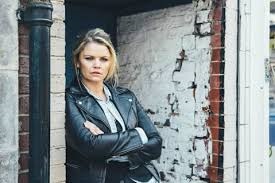
Roseanne
We watched this back in the day (88-97) and rewatching it now is punctuated by cries of ‘OMG that’s George Clooney’, or spotting Big Bang Theory cast members (Sheldon’s mum and Lesley Winkle, with Leonard still to show). But what we also realised was how much of our approach to parenting came from this show, where family life is chaotic, temperamental, combative but always loving. And ‘our’ tradition of summoning family members to the meal table with a loud cry of ‘FOOOD’ appears to have been inspired by the Conners as well. As I recall, things went seriously off kilter in later series, but so far, so funny. Joss Whedon had a hand (probably just a fingertip in some eps) in the early series, which can’t ever be a bad thing.
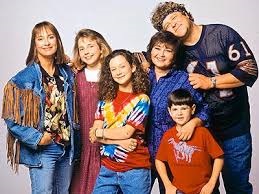
Résistance
French drama focusing on the activities of various Resistance groups in Occupied France – this was obviously a must-watch for me. I hadn’t expected it to be as close to real events as it was, which was a mixed blessing, as I quickly realised who was doomed and who might survive… The central female character, Lili, was a fictional construct, which seems to have annoyed some viewers, but I felt it was a valid way of providing a thread to link the early activity of the Musée de l’Homme group with the Maison de la Chimie and the Combat and Manouchian groups, taking us all the way through to the Liberation. It was a powerful, well constructed drama. And the renditions of the Marseillaise, ringing out in prison cells and in the face of firing squads, came back to us so intensely in November when that spirit of defiance was called upon once again.
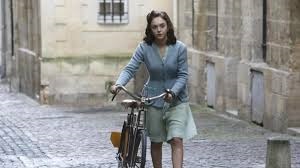
Fargo
If the idea of series 1 seemed in principle a bit odd, a second series was all the more so. But if anything, series 2 is even better, even madder, even wittier than the first. The film had Frances McDormand, who is always a very good thing, and series 1 had Allison Tolman, who filled those shoes admirably. In series 2 we root for her dad, Lou (we’ve gone back in time) and grandad Hank (played by Ted Danson), and her mother Betsy (I would like some time to see Cristin Milioti NOT dying of cancer, if that’s OK). And we do kind of root for Peggy too, with her passion for self-actualisation and ‘being the best me I can be’, even if it proves somewhat dangerous for those around her.

Honourable mentions to Homeland, Doctor Foster (Suranne Jones magnificent as a woman scorned), and Jonathan Strange & Mr Norrell.
And of course there was Doctor Who. This year’s Who was top notch. Capaldi really found his voice, the plots were rich and complex without being merely baffling, and the climactic episodes were powerful and moving. I will be writing more about Who in due course.

Theatre
On the Crucible main stage, we saw Arthur Miller’s Playing for Time, with a stunning performance from Sian Phillips, and Romeo & Juliet, with Freddie Fox and Morfydd Clark as the lovers. The Miller play seemed stagey at times (an odd criticism, in a way, for a stage play) but the performances carried it and I reflected afterwards on the way in which the Nazi death machine was itself stagey, whether the intention was to terrify and subjugate, or to deceive. Romeo & Juliet was terrific, but reminded me of how bloody annoying those two are, and it’s no disrespect to the actors that I wanted to give them both a good slap.
Music
Operatic outings this year included a fabulous Kiss me Kate, a powerful Jenufa, and a magnificent Flying Dutchman, all from Opera North.
I’ve written previously about the splendid Bassekou Kouyate gig at the University’s Firth Hall.
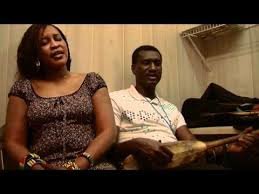
At the Crucible Studio, Ensemble 360 treated us to performances of Mendelssohn, Ives, Janacek, Watkins, Brahms, Berg, Boulez, Kurtag, Mozart and Bartok, amongst others. Such fantastic musicians, and particularly delighted to have had the chance to hear so much 20th century music this year. Same venue, different ensemble – Chris Biscoe’s Profiles of Mingus feat. Tony Kofi on sax (we’d heard him playing Mingus last year, with Arnie Somogyi’s Profiles of Mingus). More jazz, courtesy of Leeds Jazz Orchestra (feat. one Aidan Hallett) in Leeds Golden Acre Park.
And then there was Tramlines. Nothing much to add to what I said at the time, except that I can’t wait for the 2016 festival.
So, thanks to those who shared these highlights with me. I look forward to lots more in 2016.
I hope to blog more in 2016, of course. I managed a post most months in 2015, and the overall total looks more impressive thanks to eight in Refugee Week and a few reblogs from That’s How the Light Gets In and Nowt Much to Say. I blogged for Holocaust Memorial Day, wrote about the Hillsborough inquests, the 24 Hour Inspire, Marvel films, Tramlines, the phenomenon of the ‘fugueur’, the music of Mali, the ‘refugee crisis’, and the murderous attacks by Daesh in Paris and elsewhere. I also blogged for Inspiration for Life, and on the aftermath of the May General Election. Thanks to all who have read, liked, reblogged, commented, etc.
And for 2016, which may seem to hold so much threat and so little hope, I cannot do better than to quote this poem, by Sheenagh Pugh. Apparently she doesn’t rate it – scribbled it in a hurry on a card for a friend going through a tough time. I beg to differ.
Sometimes things don’t go, after all,
from bad to worse. Some years, muscadel
faces down frost; green thrives; the crops don’t fail,
sometimes a man aims high, and all goes well.A people sometimes will step back from war;
elect an honest man, decide they care
enough, that they can’t leave some stranger poor.
Some men become what they were born for.Sometimes our best efforts do not go
amiss, sometimes we do as we meant to.
The sun will sometimes melt a field of sorrow
that seemed hard frozen: may it happen for you.
May it happen for you, may it happen for all of us.
2014 – some of the best bits
Some of the cultural highlights of my year – a year of working at home, long train journeys to long meetings which gave me more time to read, less time to go to the cinema or the theatre. However, I did manage a few outings…
- Twelfth Night at the Crucible – a real delight. I’d been disappointed that we weren’t getting a tragedy or one of the problem plays, rather than a comedy that I’d seen on stage before, but that feeling evaporated very quickly indeed. The performances were excellent, the staging imaginative and suggestive of darker undercurrents (the cast appearing at windows almost like the undead, the showers of rose petals – see also Poppeia).
- Brilliant opera at Leeds Grand – La Boheme, and The Coronation of Poppeia. And another Boheme, this time in Graves Gallery, from Opera on Location.
- Tramlines!
- Music in the Round – I’d pick out the Schubert octet, Tim Horton’s bravura performance of the Prokofiev Piano Sonata no. 7 (described by the Guardian as ‘ferocious’), Charlie Piper‘s WWI suite, The Dark Hour; works by Schulhoff & Haas, and consort of viols, Fretwork.
- Once again we celebrated Tim Richardson’s life and passion for learning and teaching with the 24 Hour Inspire – 24 hours of lectures on a host of topics, from WWI poets to insect sex, from biogeography to Mozart, from underground science to fairground history – ok, you get the picture. Once again a host of people stepped up to help, everything ran smoothly, and we were able to donate to Rotherham Hospice and Impact Young Heroes. We’ll be doing it again on 16-17 April 2015. Tim’s charity, Inspiration for Life, goes from strength to strength.
- I revisited the City Ground after far too many years, for the first home game of the season, and Stuart Pearce’s first game as manager. That was a great game. We’re in a slump at the moment, and that early euphoria has dissipated. If it was anyone but Psycho in charge I suspect the calls to sack the manager would be ringing out right now, but few Forest fans would want to deny him the chance to turn things around. I hope he can. I really, really, hope he can.
Top TV of 2014
No attempt at ranking. How could one decide on the relative merits of a gritty cop drama and a comic book fantasy? So, what do all of these shows have in common? First, excellent writing, and great performances. Essential to have both. So many big budget dramas skimp on the former and blow the budget on the latter, but even the best actors can only do so much with a script that clunks. Second, great female characters. All of these programmes basically kick the Bechdel test out of the park. It’s not just about having ‘strong’ women. Not all women are strong, and no women are strong all of the time. It’s about having women characters who are rounded human beings, fallible and flawed, but not dependent on men to make decisions or to solve problems. Some of these women do indeed kick ass, but they don’t all have to. So, to Nazanin Boniadi, Alison Brie, Yvette Nicole Brown, Amelia Bullmore, Lauren Cohan, Clare Danes, Siobhan Finneran, Danai Gurira, Keeley Hawes, Elizabeth Henstridge, Gillian Jacobs, Suranne Jones, Nimrat Kaur, Sarah Lancashire, Melissa McBride, Vicky McClure, Tatiana Maslany, Lesley Sharp, Allison Tolmin, Ming-Na Wen and the rest – cheers, and thanks for giving us images of women that are as diverse and complicated as actual real live women are.
- Fargo – I was decidedly unconvinced beforehand, but it turned out to be funny, gruesome, and touching, with one of my favourite women cops in Allison Tolmin’s Molly (not just a re-run of Frances McDormand’s marvellous Marge from the film, but a character in her own right), Billy Bob Thornton as a grimly hilarious killer and Martin Freeman as a weaselly one, and a wealth of other characters, some of whom we came to care about so much that at tense moments there was much yelling at the screen as we thought they might be in danger.
- Line of Duty – I wasn’t convinced about this one either, mainly because the first series had been superb, and I wondered if they could match it. They did, and it was Keeley Hawes’ performance that clinched it. Whilst I’d watch Vicky McClure in anything, Keeley wasn’t in that category for me, despite Ashes to Ashes. But in this she was riveting, absolutely mesmerising. The rest of the cast was superb too.
- Happy Valley was perhaps the most ironically titled programme of the year. This valley was pretty damned grim. But Sarah Lancashire as cop Catherine Cawood was wonderful, and the story was compelling and moving.
- Scott & Bailey maintained its form in series 4. The three central women (count them! three central women!) are all convincingly real, sometimes infuriatingly so.
- The Walking Dead opened series 5 with an episode so gripping that I really could neither breathe normally nor speak for quite some time. It’s maintained that tension (more or less) whilst varying the format, to focus on different subsets of the characters, and different locations. Carol has been central to this season’s episodes so far, and her character is one of those that has been allowed to develop and deepen throughout. There’s no shortage of other interesting characters, and the plot allows for philosophical, political and ethical speculation as well as for gory shocks and suspense.
- Agents of Shield got past a slightly wobbly first series and got its pace and tone just right. It fits right into the Marvelverse, but stands alone perfectly well. And it features girl-geek Simmons, a Sheffield lass, and there’s just a hint of South Yorkshire in her accent from time to time.
- Community made me laugh more than anything else this year. Just when you think it is as bonkers as it could be, it ups its game, to be even more meta, and even more daft.
- Doctor Who I have spoken of elsewhere. I have a deep love for this programme, and whilst this regeneration has been unsettling at times, uncertain in tone perhaps, I have great hopes for Capaldi and Coleman in series 9 next year.
- Homeland redeemed itself. Gripping stuff, with Clare Danes acting her socks off and getting us deeper into what makes Carrie tick.
- Orphan Black is one of the most criminally underrated programmes of this (and last) year. Tatiana Maslany inhabits each of the characters she plays so well that I forget – disbelieve almost – that there is just the one actress involved. And when she’s playing one of them pretending to be one of the others…. Cracking plot too.
Films of the year – I leave the in-depth cinematic reviews to Arthur Annabel who promises an extensive blog on this topic soon. I simply note these as films which have delighted and/or moved me, in no particular order. Worth noting that whilst the programmes on my TV list get A* on the Bechdel test, the films are considerably weaker on that front. Nonetheless, some fine performances, and Nicole Perlman was the first woman with a writing credit on a Marvel movie (Guardians of the Galaxy).
Women of the year:
Jack Monroe – for enlivening my repertoire of meals to feed the family, and campaigning about food poverty
Professor Monica Grady – for being emotionally, exuberantly passionate about science
 Kate Bush – for doing it her way, as always
Kate Bush – for doing it her way, as always
 Fahma Mohamed – for telling men three times her age what they needed to be told about FGM and how to protect young women in the UK
Fahma Mohamed – for telling men three times her age what they needed to be told about FGM and how to protect young women in the UK
 Malala Yousafzai – it’s all been said really. A young woman of remarkable maturity and dignity, as well as courage.
Malala Yousafzai – it’s all been said really. A young woman of remarkable maturity and dignity, as well as courage.
 Dr Ameyo Adadevoh – helped to curb the spread of Ebola by quarantining a patient in the face of pressure from his government, but succumbed to the disease herself
Dr Ameyo Adadevoh – helped to curb the spread of Ebola by quarantining a patient in the face of pressure from his government, but succumbed to the disease herself
 Laura Bates – her Everyday Sexism project helped to give women a voice, to tell their stories, to shout back.
Laura Bates – her Everyday Sexism project helped to give women a voice, to tell their stories, to shout back.
In 2014 I’ve blogged about refugees, genocide, football, W G Sebald and Michel Butor, Kazuo Ishiguro, everyday sexism, Tramlines, Josephine Butler and Doctor Who. I got a bit personal on the subject of depression, and was inspired by Caitlin Moran’s How to Build a Girl to present my manifesto – a plea to just be kind. And my blog about reading the last of the Resnick series of detective stories won the approval of the author, John Harvey, who linked to it on his own blog, and republished my jazz playlist!
Amongst the blogs I’ve followed, or at least tried to keep up with, I would particularly note Searching for Albion. This is the record of Dan Taylor’s four month cycling trip across the British Isles, talking to people he meets, by plan or by chance. A fascinating project, beautifully documented.
To all of those who’ve shared some of the above events, obsessions and enthusiasms with me, who’ve given me support when I’ve needed it, who I’ve learned from and with, thank you. I don’t know what to expect from 2015 – but see you there!
2013 – the best bits. And some of the other bits.
Posted by cathannabel in Events, Film, Literature, Music, Personal, Television, Theatre on December 31, 2013
It has been a funny old year. Funny peculiar, though not without the odd moment of mirth and merriment along the way.
I came back from one secondment to my regular job in January, and went off on the next secondment in December. This new one is a major change – working for HEFCE, based at home when not attending meetings in various exotic parts of the UK (oh, OK then, Croydon, Birmingham, Manchester, Dorking…). It’s a fantastic opportunity, and challenges the way I organise my life as well as requiring me to acquire new knowledge and new skills.
I graduated, again. Did the whole gown and mortar board thing which I hadn’t been fussed about when I was 21 and graduating for the first time. And then, with barely a pause, on to the doctorate. Studying part-time, it’s going to be a long haul, with who knows what possibilities at the end of it, but I’m loving it.
In February, a beloved friend and colleague died, and we – his family, friends, colleagues, students – grieved but also worked together to put on an amazing event in his honour, the 24 Hour Inspire. We raised money for local cancer charities, and have raised more since, through an art exhibition, plant and cake sales and various 10k runs/marathon bike rides, etc. And we’re now planning the 24 Hour Inspire 2014, and the publication of Tim’s diary. He will continue to inspire.
Culturally, my high points in 2013 have been:
- Chimamanda Ngozi Adichie at the Showroom, talking about Americanah, and Half of a Yellow Sun
- Peter Hill premiering newly discovered/completed Messiaen at the Upper Chapel (and playing Bach, Berg and Schoenberg too)
- Arnie Somogyi’s Scenes in the City, playing Mingus at Sheffield Jazz
- Tramlines – the Enid in the City Hall, Soukous Revelation in the Peace Gardens, Jim Jones Revue and Selecter at Devonshire Green. (And more, but those were the absolute top bits).
- The 24 Hour Inspire – 24 hours of lectures on life, the universe and everything, including Ed Daw’s blues piano, Rachel Falconer on poetry and birds, Jenny Saul on implicit bias, Claire McGourlay on the Innocence Project, and personal narratives from Brendan Stone and Elena Rodriguez-Falcon. Plus John Cockburn’s rendition of (What’s so Funny ’bout) Peace Love and Understanding, and my favourite Beatles B-side, Things we Said Today, and more busking from Mike Weir, Graham McElearney and Eugenia Chung. And more, lots more.
- Fabulous Beethoven quartets/quintet from the Elias at the Upper Chapel
- A magical Winter’s Tale at the Crucible
- Two awesome Britten operas (Peter Grimes and Death in Venice) from Opera North at Leeds Grand
- New (to me) authors enjoyed this year: Maggie O’Farrell, Louise Doughty, Lucy Caldwell, C J Sansom, Alison Moore, Edward St Aubyn, Rebecca Solnit, Wilkie Collins, Jonathan Franzen
- Wonderful new books from authors I’ve enjoyed before: Stephen King’s Dr Sleep and Joyland, Lynn Shepherd’s A Treacherous Likeness, Jon McGregor‘s This isn’t the Sort of Thing…., Robert Harris’s An Officer and a Spy
- Finally finished Proust’s Sodome et Gomorrhe. Allons-y, to La Prisonniere!
- I’ve learned to love Marvel superheroes (Avengers Assemble! Thor! Iron Man! Agents of Shield!), and have thrilled to The Walking Dead, Orphan Black (virtuoso performance(s) from Tatiana Maslany), Utopia and, of course, Dr Who.
- Speaking of which, not only an absolutely stonking 50th anniversary episode, but also a fascinating and very touching drama about the show’s early days, with David Bradley as William Hartnell, the sweet and funny The Five-ish Doctors, with Peter Davison, Sylvester McCoy and Colin Baker sending themselves and everyone else up with great affection, and Matthew Sweet’s Culture Show special. And the Christmas episode…
- Other cracking telly – Broadchurch, Homeland, Misfits, The Fall, Southcliffe, The Guilty, The Americans… And from across the Channel, not only another masterclass in French profanity from Spiral, but the wonderful The Returned
- And other top films – Joss Whedon’s Much Ado, Lore, The Hobbit Pts 1 & 2, Lincoln, and Patience (after Sebald).
About the blog itself. It’s been less focused on my areas of research recently, and that will continue to be the case, as I’m working on the PhD. The odd digression will find its place here – as Tim used to say, tangents are there to be gone off on, and the blog is a good way of nailing those (to mix my metaphors somewhat) and stopping them from distracting me for too long. I shall be continuing to go on about all sorts of other things that pique my interest. In particular the blog will continue to be a place where refugee stories are foregrounded, as a riposte to the mean and dishonest coverage which those stories tend to receive.
Over the last year, my posting has been somewhat erratic. I note that I didn’t write anything between March and June (I made up for it in June, however, with a Refugee Week blog-blitz, as well as a piece about Last Year at Marienbad which I still intend to follow up. That hiatus may have had something to do with being in the final stages of my degree – finishing off my dissertation, and a last batch of essays and presentations.
There are so many fantastic bloggers out there, too many to do justice to. We lost one this year, as the great Norman Geras passed away. But I’ll continue to enjoy, and to share/reblog That’s How the Light Gets In, Nowt Much to Say, and Futile Democracy, amongst others. For my research interests, I will no doubt continue to find lots to think about and follow up in blogs from Decayetude and Vertigo.
So, thanks to the aforementioned bloggers, to the various people with whom I’ve shared the cultural delights enumerated above, to friends and family who’ve supported me in my ventures and refrained (mostly) from telling me I’m mad to try to do so many things.
Thing is, I have a history of depression. I know that the best way for me to fight that, to avoid sliding back into that dark pit, is to do lots of stuff I care about. So, not just the job – which I care about, passionately – and my wonderful family, but research, writing, ensuring that we do Tim proud via the charity, and so on. I am very aware that there’s a tipping point, that if I do too much stuff I care about, given that I also have to do stuff that I have to do, just because I have to do it, the anxiety of having so much going on can itself lead to sleepless nights, which make me less able to cope, thus leading to more worrying and so on and on… It’s all about balance, and about having support when I need it. So, to all of you who, whether you know it or not, provide that support, and help me to keep that balance, a heartfelt thanks.
In particular, over this last year, I’d like to thank:
For unstinting support and encouragement through the part-time degree and especially as I reached the final stages – tutors Sophie Belot and Annie Rouxeville, and classmate Liz Perry. And a special thanks to Chris Turgoose for ensuring that my graduation gown stayed put via an ingenious arrangement of string and safety pins.
For support and encouragement to go on to the PhD – the aforementioned Sophie, Annie, and Liz, plus Rachel Falconer, Helen Finch, and my supervisors Amanda Crawley Jackson and Richard Steadman-Jones
For their contributions to the work of Inspiration for Life, and the 24 Hour Inspire, and their support in commemorating and celebrating Tim – Tracy Hilton, Ruth Arnold, Vanessa Toulmin, Chris Sexton, John Cockburn, Lee Thompson, Matt Mears and David Mowbray
My family, of course, without whom…
And, finally, Tim. I’d have loved to share this year’s triumphs and tribulations with him.
Have a wonderful 2014 all of you.
Uncertainty – physics, ethics and politics
Posted by cathannabel in Science, Second World War, Theatre on March 11, 2012
Once you start thinking about labyrinths they crop up everywhere. Just recently the context was crime fiction, particularly of the noir variety (to be another blog, soon). The other night, it was memory, memories of a specific encounter, that between Danish physicist Niels Bohr and his former protege Werner Heisenberg, in September (or was it October?) 1941. As the protagonists, aided and challenged by Bohr’s wife, Margrethe, try to ‘follow the threads right back to the beginning of the maze’ (p.56), the answers they seek elude them as soon as they seem to be within reach. Michael Frayn’s Copenhagen, just ended at the Lyceum Theatre in Sheffield (part of a season of his work), entwines physics, philosophy and politics (and is the only evening at the theatre I can recall when interval chat in the bar concerned semiconductor-based quantum optical memories).
The play starts with a question – why did Heisenberg visit Bohr in Copenhagen in 1941 – and the possible answers put forward by all three protagonists are diverse and contradictory, but not mutually exclusive (complementarity theory at work). Did H, then working in Nazi Germany, want to recruit B to help with their atomic weapons programme? To pump him for information about either the science or the progress being made by British and American scientists working in the field? To warn or offer him some sort of protection from Nazi racial policies? To seek absolution and forgiveness? Perhaps all of the above. But as they re-run and redraft the encounter, the moral certainties become muddied, and clear again, repeatedly.
The play has been criticised for leaving us with these questions unanswered. For some, there’s no ambiguity at all – Heisenberg was a German patriot, who supported Hitler’s war aims, and his nuclear programme. Frayn’s human and conflicted portrayal is therefore a form of revisionism. I didn’t read it like that. The play allows Heisenberg to present a variety of self-justifications – his patriotism, arising out of the humiliation and deprivation that followed the first war, the fact that he did not tell Albert Speer how a bomb could have been made, the fact that he ‘never managed to contribute to the death of one single solitary person’. Unlike Bohr, who did make some contribution to the Allied nuclear programme, and thus played a ‘small but helpful part in the deaths of a hundred thousand people’ (p.91) at Hiroshima and Nagasaki. However, that Heisenberg presents those self-justifications, or allows them to be presented by the generous-spirited Bohr, does not mean that the audience accepts them, any more than we accept Heisenberg’s equation of the ‘impossibly difficult situation’ faced by Bohr with his own (p.21).
When Heisenberg speaks of the hardships and devastations visited on his country after the first war, we surely cannot help but think of the hardships and devastation currently being visited by his country on occupied Europe. When he ducks the occasional challenges about the expulsion of Jewish scientists, about the deaths of fellow-scientist Goudsmit’s parents in Auschwitz (‘He thought I should have done something to save them. I don’t know what. So many hands stretching up from the darkness for a lifeline, and no lifeline that could ever reach them’), about the possibility of resistance (‘You think I should have joined the plot against Hitler and got myself hanged like the others. …What would it have achieved?’) do we let him off the hook? Hardly. And nor do Bohr and Margrethe.
The only possible claim for absolution would rest in the suggestion that Heisenberg chose not to consider doing a particular calculation knowing that it would have shown the possibility of using fission to create a weapon. Everything we are told about Heisenberg’s character seems to make this unlikely. David Lindley, in his fascinating book Uncertainty, concludes that Heisenberg was ‘not the man to do practical nuclear physics or engineering’, and had genuinely never figured out how a bomb would work. He says that ‘this failure transmuted into a story that the Germans, meaning in particular Heisenberg, had turned away from the moral repugnance of building atomic weapons, or had even deliberately misled their political superiors about the feasibility of doing so. Heisenberg never exactly said this. He never exactly denied it’ (pp. 221-2). That he was prepared to allow this suggestion to remain in the air, perhaps even in preference to the suggestion of a scientific failure, scarcely redeems him. Similarly, when the possibility occurs to Bohr that Heisenberg had directly or indirectly enabled his own escape from Denmark, and those of thousands of Danish Jews – Heisenberg doesn’t confirm or deny this, not exactly. He says ‘Nothing to do with me, by that time. I regret to say’, but has earlier claimed Duckwitz from the German Embassy, the man who forewarned the Resistance of the timing for the SS roundup, and reported the entire patrol boat squadron unseaworthy on the night of the escape, as one of ‘his’ men. Strangely, Heisenberg (in the play) credits Duckwitz with having persuaded the Swedish government to accept the refugees, whereas other sources claim that it was Bohr himself who did so, delaying his own departure from Sweden to the US until he had won that concession. Uncertainty piled upon uncertainty. In the end, Frayn trusts the audience to draw its own moral conclusions.
From an arts & humanities viewpoint, we tend to see science as a realm of certainties, of clarity and precision. But, to quote a physicist friend, science is not an exact science. However, what Heisenberg means by uncertainty is not the fuzzy thing that I might mean by it, even though one of the words he used – Unscharf – does mean blurredness or fuzziness. It’s about the limitations of measurements – the way in which precision in the measurement of one variable implies a reduced precision in measurement of the related variable, but ‘this ratio, the uncertainty relationship, is itself precisely formulable’ (Frayn, p.98). In relation to human memories and motivations, obviously, there isn’t a precise ratio. However, the basic principles that the observer changes the thing observed, that the act of observation determines what is and isn’t observed, lend themselves readily to wider application, and the uncertainty of thoughts is ‘a systematic limitation which cannot even in theory be circumvented’ (Frayn, 99). Heisenberg and Einstein clashed bitterly over uncertainty – the former insisted that we could not construct ‘an absolute, God’s eye view into the inside of an item’ but merely observe its behaviour, in various ways, and infer what we could from that, whilst the latter maintained that whilst observers might disagree, ‘events retain a distinct and unarguable physicality’ such that a consensus could be arrived at between apparently conflicting accounts and an underlying objectivity persists. (Lindley, 132). Bohr brought a particular perspective to this ‘inexactness’ – complementarity, the mixing of incommensurable concepts, which have necessary but contradictory roles to play – ‘an unavoidable disharmony’ (Lindley 148).
Bohr and Heisenberg are incommensurable concepts themselves – Heisenberg who skis at speed down the slope, caring only that he gets there, that it works, never caring ‘what got destroyed on the way’, whilst Bohr does ‘seventeen drafts of every slalom’ (pp 24-5). Bohr revels in the contradictions, whilst Heisenberg lives and breathes paradox and contradiction but ‘can no more see the beauty of them then the fish can see the beauty of the water’ (pp 65-6).
It’s often said that for evil to triumph all that is required is for good men to do nothing. In this case, just possibly, evil was thwarted by inaction rather than action. Had Bohr argued the science with Heisenberg in 1941, the latter might have realised the crucial calculation that would enable the bomb to be built in time for Hitler to use it. Margrethe suggests that this was ‘the last and greatest act of friendship’, to leave Heisenberg misunderstood. In the Lyceum production, as the final redraft takes place, and this time Bohr doesn’t walk away, but asks him why he is so confident that building a bomb would be ‘reassuringly difficult’, in the background we hear a low booming sound, increasing in volume as Heisenberg stops and says ‘Hold on’ and ‘a very different and very terrible new world begins to take shape’ (p.89).
The Lyceum production was wonderfully performed by Henry Goodman, Geoffrey Streatfeild and Barbara Flynn, and, as Jonathan Brown said in the Independent, ‘the sheer intelligence of the drama and its subject matter is a thing of beauty’ (9/3/12). It makes demands on its audience, it challenges, but it’s also moving and haunting, and terribly hard to forget.
If I’ve misrepresented science in any of the above, I humbly beg its forgiveness.
Michael Frayn, Copenhagen (London: Methuen, 2003)
David C Cassidy, ‘A Historical Perspective on Copenhagen’, http://web.gc.cuny.edu/ashp/nml/copenhagen/Cassidy.htm
David Lindley, Uncertainty: Einstein, Heisenberg, Bohr, and the Struggle for the Soul of Science (NY: Doubleday, 2007)
http://records.viu.ca/~johnstoi/introser/frayn.htm
http://www.pbs.org/hollywoodpresents/copenhagen/scene/index.html






































































